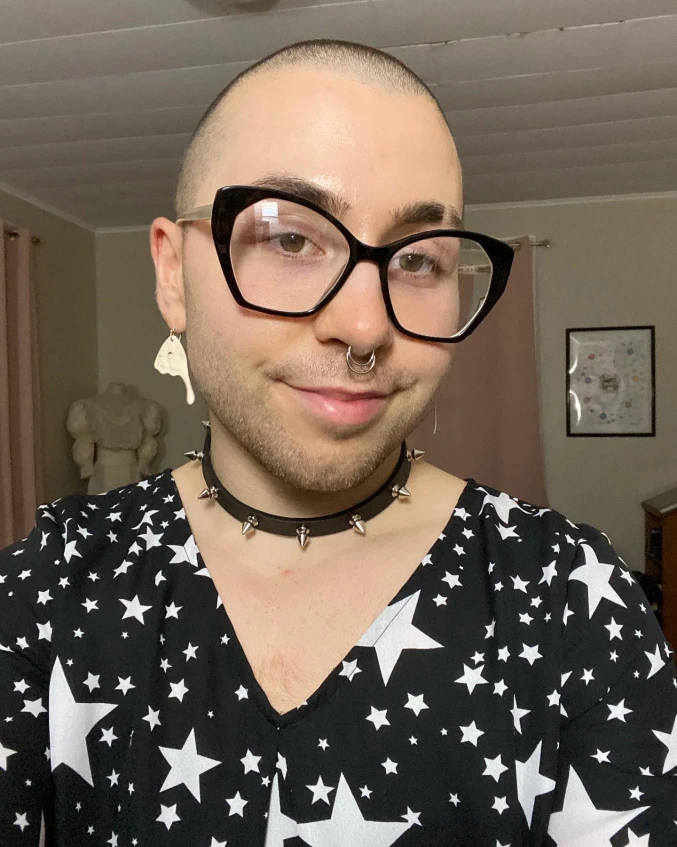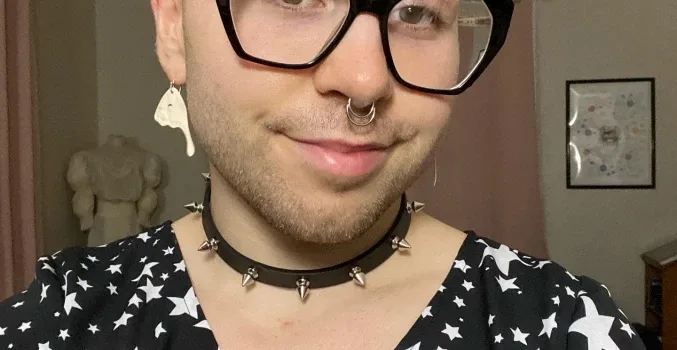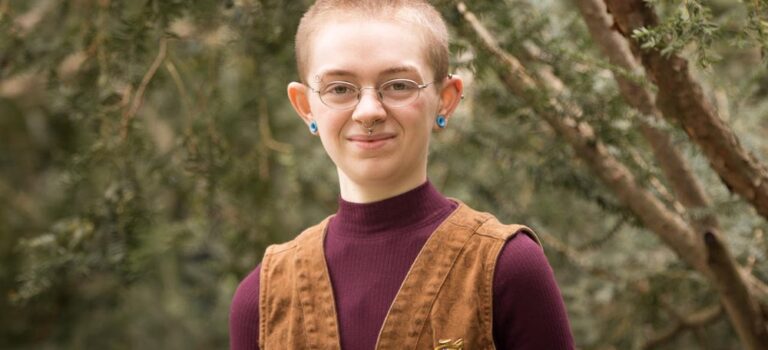
Superstition Review is excited to share a podcast project planned and produced by SR intern Claire van Doren. In this four-episode audio series, Claire will be talking with SR’s queer contributors. In today’s episode, Claire interviews Robin Gow (they/ze/he). They are the author of a number of chapbooks and novels for young readers, many of them forthcoming in 2023. Their works include Honeysuckle at Finishing Line Press, Backyard Paleontology at Glass Poetry (Forthcoming 2023), and A Museum for That Which No Longer Exists at Alternating Current Press (Forthcoming 2023), A Million Quiet Revolutions, Ode to My First Car (forthcoming 2023), and others. They are the managing editor of The Nasiona. To learn more, visit his website.
The following transcript has been edited for clarity. Credit goes to FreeSound.org for the sound effects.
Claire van Doren: Hi! My name’s Claire van Doren, and you’re listening to the Superstition Review Pride Community Project. Today, we’ll be hearing from Robin Gow. They’ll be discussing their experiences with the queer community and how it impacts their work. This is one of four Pride Community specials. Stick around to hear from more of Superstition Review’s queer contributors.
[Phone ringing]
Robin Gow: My name is Robin Gow, and I use any pronouns but she. I’ve worked in a lot of different genres: I do poetry, young adult and middle-grade books, and kind of hybrid essay work, too. I think of myself as a very hybrid writer, and I think that’s because the way my brain works and the experience I’ve had as a trans person don’t fit neatly into things. My narratives are very messy. I turn often to poetry because poetry is very forgiving of strangeness and welcoming toward narratives that break apart and fracture and that kind of thing.
But I’m trying to find that space in fiction and essay, too. I definitely think that it influences me in that way. Like every non-binary person, that kind of translates into having non-binary impulses in genre. Like, I don’t totally believe in genre. I think having that knowledge about myself as “between” a lot of things has definitely affected me and my writing.
I like to think of my poems as mini-conservations that I can start with someone else. There’s this essay by Frank O’Hara, where he talks about a poem as squarely between himself and another person. And I guess I think of my poetry like that. I always want it to be in conversation. Or, if not in conversation, then maybe a letter to someone. I think that I’m often writing towards a community because I feel like the word community is really complex, and the spectrum of people so diverse as LGBTQ+ people. And I see that in my work at the LGBTQ+ Center—working in social services in general. It makes me very interested in the small, beautiful intricacies of peoples’ lives—because a lot of the work that I do is creating programs and space for queer people. And I think I’ve just learned a lot about community and its expansiveness.
I think it often motivates me a lot in terms of my more narrative work—like the young adult fiction I write. But I think that it impacts my poetry, too. I guess that it motivates me, it makes me more interested in creating, because I know that there is contact with the community that I write for. Because I feel that I write primarily for other queer people.
It makes me go back to high school and some of the books I read that really sparked my interest in literature as a whole. And I think that I had a long period of reading a lot of stories in the magical realism genre. Specifically I read 100 Years of Solitude alone in high school, and I think there’s so much I didn’t get because I was a high schooler. I didn’t get the global context that Gabriel García Márquez is writing in.
The ways in which writers of that movement are writing into complete strangeness in day-to-day life has always affected me. Because I think reading that work in high school had a lot of impact on me. And it’s interesting, then—at the same time I was reading that, I was also watching a lot of anime. Which I think sounds funny as a huge influence, but I think it had a huge influence on me because anime is very fantastical. There’s a lot of questions of what it means to be a person in the world that are addressed in some of the animes I really like.
And then more lately, I just other queer writers—like Jos Charles’ book Feeld is very influential. I wish it could influence me more because it’s just so brilliant. And then I think also, currently, I’m really into horror—because I feel like, in current cinema, that’s a place where people are committed to being really weird. And I think I’m just really fascinated by that. That’s also something that I think influences my work.
As a trans person, and also as someone who’s neurodivergent, who experiences the world in some strange ways, I think that that has always drawn me into thinking about where an image or something can spin off into something bigger than the mundane. Especially religious imagery. Because I was raised very Catholic, I had a lot of negative experiences with religion, especially as a queer and trans person. But I’m so fascinated by it. I’ve taken a lot of personal interest in saints and the ritual around Catholicism. Something I was always intrigued by is that the bread that they have actually transforms into Jesus’s body. They don’t believe it’s a symbol; they believe it’s an actual transformation. I think that that’s kind of sparked an interest in me, where the mundane goes into the magical in the day-to-day world. I find an interest in where day-to-day life can slip into something surreal or something absurd. But it’s still out of respect for mundane life or interest in it, too.
I want to write toward younger people. I think that, a lot of times, writers are against writing for youth. And I actually think that—when I think about the books that impacted me the most–it’s the things that I read when I was younger. So I’m trying to write towards—or in solidarity with—queer youth. And I hope that my writing can create some of those conversations.
And then I’m also interested in exploring a hybrid fiction novel. It’s hard because I write in very strange genre formations, but I guess what I’m trying to achieve in the future is not letting that baggage I have about genre influence me creating something.
Because if I don’t finish it, then it will never be a thing, you know?
[Phone hangs up]
CVD: Thanks for joining us! Be sure to check out our YouTube page for more audio and video content, as well as our official Superstition Review blog.


